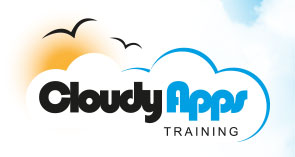


Cloud Computing Courses
Overview of cloud computing
The Wikipedia entry on Cloud Computing uses the analogy of an electricity grid to describe the basic concepts underlying cloud computing "Cloud computing provides computation, software, data access, and storage services that do not require end-user knowledge of the physical location and configuration of the system that delivers the services. Parallels to this concept can be drawn with the electricity grid, wherein end-users consume power without needing to understand the component devices or infrastructure required to provide the service."
The attraction of cloud computing is the in the possibility of adding extra IT capacity, or data processing capabilities or access to new applications without having to invest in extra infrastructure, having to train new admin staff, or having to purchase new software, but, instead being able to make use of a usage or subscription-based service. This is now a realistic possibility thanks to the widespread availability of broadband internet connectivity and web service oriented technology.
Applications can be accessed either via a web browser, or by applications that make use of the basic HTTP protocol such as those based on RESTful services (which do not necessarily need a web browser) , or via thin client technologies (Linux, or Windows based).
The various services that constitute a cloud computing infrastructure may be either private, or, commercial, delivered through shared data-centers. The courses outlined below cover the range from a high level technical overview, through to cloud service deployment and application framework development on either Linux or Microsoft Windows platforms.
As a training and consultancy company that learns from its customers and the pupils that they send on our courses some of our insights into the potential of cloud computing has come from running technical system administration and configuration oriented courses to companies such as Rackspace and NewEgg.
Cloud computing frameworks are amazingly complex technologies and it is a real joy to see them in action, and to witness their flexibility and scalability.
As well as providing a range of standardised cloud computing courses we are open to challenges and requests for more challenging courses.
A key discussion point as far as cloud computing is concerned is that concerning deploying cloud computing applications and services using closed source vs. open source frameworks. Another area of concern is the analysis of the relative risks and benefits of migrating to IT system deployment heavily based on the use of cloud computing frameworks and to decide between using outsourced clouds vs. private clouds. Many of these issues are touched upon in our intensive one day workshop format overview of cloud computing
Our open source Cloud computing courses will be for OpenStack cloud computing framework. We also provide cloud computing courses based on the key commercial cloud computing frameworks, namely, Amazon EC2 technology, Microsoft Azure and application development using Google App Engine
Our OpenStack courses will include courses for developing and deploying private in house clouds, using private commercially hosted systems and using public cloud systems such as those available e.g. from Rackspace or Memset. In the tradition of a layered approach to mastering complex systems our technical foundations courses will be founded on courses covering virtualisation technologies. The key open source virtualisation technology courses will be those covering KVM and Xen. Because of the ever increasing power of ARM processors we have developed courses covering installation and configuration of KVM and Xen on ARM processor based embedded systems platforms.
For those that wish to get up “real close” to OpenStack ... from the virtualisation layer up our 5 day practical course - Introduction to Building and Deploying OpenStack Cloud Systems is probably the best starting point.
Currently there are no public courses scheduled ... a schedule of public courses for 2014 will be appearing shortly